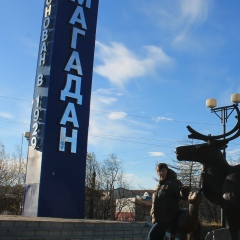из своих старинных дневников.. хорошо, что записал бабушкины воспоминания....
"Семья бабушки Войну встретила в Ленинграде. Почти всю блокаду были здесь. В 42-м завербовались на Челябинский военный завод. Отправились в эвакуацию. От семьи уже остались тогда Прабабушка, её сестра и бабушка. В блокаду, от голода, умерли ещё две прабабушки и прадед. Прадед - Дмитрий Збруев умер в январе 42-го. Последние месяцы он отдавал свои карточки жене и дочери. Говорил, что питается на работе. Бабушка считает, что это было неправдой.
Летом они отправились в эвакуацию. Бабушке было двадцать лет. Прабабушке - сорок три.
Такая история об этом моменте:
Уже отъезжая, они опоздали на пароход, который перевозил жителей на Большую Землю. Прабабушка очень ругалась и переживала. Они переправились на следующем пароходе, а в тот, на который опоздали, попала бомба и он затонул...
До Челябинска они не добрались. В пути потеряли друг друга, и уже до осени 45.
Такая история об этом моменте:
На какой-то перевалочной станции бабушка отправилась на поиски еды, воды и еле успела на отправляющийся поезд. В вагоне поняла, что прабабушку "сняли" с поезда.( Она была уже очень плоха. Дистрофия, началась дизентерия.) Уже в окно увидела свою мать - она кричала, чтобы дочь кинула ей какие ни будь документы. Бабушка выбросила в окно какой-то пакет. Потом оказалось, что это были чужие вещи...
Так прабабушка осталась в эвакогоспитале. Выжила. Рассказывала, что у них там был любимый кот Васька.
Его все любили. Но на Новый 1943 год, кто-то его забил. Погоревали немного и съели.
После госпиталя прабабушка попала в деревню под Омском, была счетоводом в колхозе. Председатель воровал постоянно, а бабушка с ним боролась, как могла. Председатель даже пристрелить её хотел, но не получилось.
Потом они помирились (Так мне в детстве было рассказано).
А деревня, кстати - это реально, называлась - Пердуновка.
Бабушка завербовалась в армию. Как я уже сказал ей было двадцать лет. Она попала на Северо-западный фронт.
"А Зори Здесь Тихие" - это о тех местах, где она воевала. На Карельском перешейке. Служила в госпитале, какое-то время при штабе, писарем, в хозчасти. Заведовала снабжением, довольствием. Служила у маршала Мерецкова.
Закончила война в Манчжурии, в Мудан-дзяне. Но это уже осень 45. Когда Америка сбросила бомбу - бабушка служила на Дальнем Востоке. Погода в августе стояла ясная и поэтому их ничем не "накрыло".
Прабабушка с бабушкой воссоединились уже после войны. Вернувшись, обнаружили, что от их квартиры им осталась только комната сестры прабабушки, которая всю блокаду была в Ленинграде, работая в институте Пастера.
К слову, до революции квартира представляла - целый этаж 42 дома по улице Коломенской. В тридцатые их постепенно уплотняли. А в войну, когда они были в эвакуации и на фронте, жильцы сверху самозахватом переехали на этаж ниже. Заняли их квартиру. Стали распродавать вещи. Продать было что. Очень не плохая коллекция картин, подлинников Айвазовского, Шишкина. Много разного другого ценного имущества. Тогда это воспринималось семьёй не очень трагично. Но судиться за площадь стали, хотя делать этого - не умели. Новые жильцы ( мать и дочь, татарки) дали взятки где и кому надо (и в Жэке, и в Суде). Было состряпано дело, что в дом попала бомба ( хотя ничего в него не попадало). Татарки продали комнату Софье Рафаиловне Тентлер. Наша семья в результате жила в, хотя и большой, но в проходной комнате. К слову, с Тентлерами отношения были хорошими. Со временем они обустроили комнату в отдельную квартиру, дверь была заделана. Суд продолжать не стали. Да и Тентлерам деваться было бы некуда, если бы решение опротестовали. Родилась моя мама, потом я родился.
Отковыривал обои в поисках "Таинственной Двери"..."
"Семья бабушки Войну встретила в Ленинграде. Почти всю блокаду были здесь. В 42-м завербовались на Челябинский военный завод. Отправились в эвакуацию. От семьи уже остались тогда Прабабушка, её сестра и бабушка. В блокаду, от голода, умерли ещё две прабабушки и прадед. Прадед - Дмитрий Збруев умер в январе 42-го. Последние месяцы он отдавал свои карточки жене и дочери. Говорил, что питается на работе. Бабушка считает, что это было неправдой.
Летом они отправились в эвакуацию. Бабушке было двадцать лет. Прабабушке - сорок три.
Такая история об этом моменте:
Уже отъезжая, они опоздали на пароход, который перевозил жителей на Большую Землю. Прабабушка очень ругалась и переживала. Они переправились на следующем пароходе, а в тот, на который опоздали, попала бомба и он затонул...
До Челябинска они не добрались. В пути потеряли друг друга, и уже до осени 45.
Такая история об этом моменте:
На какой-то перевалочной станции бабушка отправилась на поиски еды, воды и еле успела на отправляющийся поезд. В вагоне поняла, что прабабушку "сняли" с поезда.( Она была уже очень плоха. Дистрофия, началась дизентерия.) Уже в окно увидела свою мать - она кричала, чтобы дочь кинула ей какие ни будь документы. Бабушка выбросила в окно какой-то пакет. Потом оказалось, что это были чужие вещи...
Так прабабушка осталась в эвакогоспитале. Выжила. Рассказывала, что у них там был любимый кот Васька.
Его все любили. Но на Новый 1943 год, кто-то его забил. Погоревали немного и съели.
После госпиталя прабабушка попала в деревню под Омском, была счетоводом в колхозе. Председатель воровал постоянно, а бабушка с ним боролась, как могла. Председатель даже пристрелить её хотел, но не получилось.
Потом они помирились (Так мне в детстве было рассказано).
А деревня, кстати - это реально, называлась - Пердуновка.
Бабушка завербовалась в армию. Как я уже сказал ей было двадцать лет. Она попала на Северо-западный фронт.
"А Зори Здесь Тихие" - это о тех местах, где она воевала. На Карельском перешейке. Служила в госпитале, какое-то время при штабе, писарем, в хозчасти. Заведовала снабжением, довольствием. Служила у маршала Мерецкова.
Закончила война в Манчжурии, в Мудан-дзяне. Но это уже осень 45. Когда Америка сбросила бомбу - бабушка служила на Дальнем Востоке. Погода в августе стояла ясная и поэтому их ничем не "накрыло".
Прабабушка с бабушкой воссоединились уже после войны. Вернувшись, обнаружили, что от их квартиры им осталась только комната сестры прабабушки, которая всю блокаду была в Ленинграде, работая в институте Пастера.
К слову, до революции квартира представляла - целый этаж 42 дома по улице Коломенской. В тридцатые их постепенно уплотняли. А в войну, когда они были в эвакуации и на фронте, жильцы сверху самозахватом переехали на этаж ниже. Заняли их квартиру. Стали распродавать вещи. Продать было что. Очень не плохая коллекция картин, подлинников Айвазовского, Шишкина. Много разного другого ценного имущества. Тогда это воспринималось семьёй не очень трагично. Но судиться за площадь стали, хотя делать этого - не умели. Новые жильцы ( мать и дочь, татарки) дали взятки где и кому надо (и в Жэке, и в Суде). Было состряпано дело, что в дом попала бомба ( хотя ничего в него не попадало). Татарки продали комнату Софье Рафаиловне Тентлер. Наша семья в результате жила в, хотя и большой, но в проходной комнате. К слову, с Тентлерами отношения были хорошими. Со временем они обустроили комнату в отдельную квартиру, дверь была заделана. Суд продолжать не стали. Да и Тентлерам деваться было бы некуда, если бы решение опротестовали. Родилась моя мама, потом я родился.
Отковыривал обои в поисках "Таинственной Двери"..."
from his old diaries .. it’s good that my grandmother wrote down the memories ....
"The grandmother’s family met the war in Leningrad. Almost the entire blockade was here. In the 42nd they recruited to the Chelyabinsk military plant. They went to the evacuation. Great-grandmother, her sister and grandmother were already left from the family. Two more great-grandmothers died of hunger, from hunger and great-grandfather. Great-grandfather - Dmitry Zbruev died in January 42. In recent months, he gave his cards to his wife and daughter. He said that he was eating at work. Grandmother believes that this was not true.
In the summer they went to the evacuation. Grandma was twenty years old. Great-grandmother - forty-three.
Such a story about this moment:
Already leaving, they missed the steamer, which transported residents to the mainland. Great-grandmother cursed and worried. They crossed on the next boat, and the one on which they were late got a bomb and he sank ...
They did not reach Chelyabinsk. We lost each other along the way, and by the autumn of 45.
Such a story about this moment:
At some transshipment station, my grandmother went in search of food, water and barely managed to catch a train. In the carriage I realized that my great-grandmother was “taken off” from the train. (She was already very bad. Dystrophy, dysentery began.) She saw her mother through the window - she screamed for her daughter to throw her any documents. Grandmother threw some bag out the window. Then it turned out that these were other people's things ...
So the great-grandmother remained in the evacuation hospital. Survived. She told me that they had a favorite cat, Vaska.
Everyone loved him. But on the New Year of 1943, someone scored it. They were a little bit warm and ate.
After the hospital, the great-grandmother came to a village near Omsk, was a bookkeeper on a collective farm. The chairman stole constantly, and the grandmother fought with him as best she could. The chairman even wanted to shoot her, but failed.
Then they made peace (So it was told to me in childhood).
And the village, by the way - it’s real, was called - Farting.
Grandmother enlisted in the army. As I said, she was twenty years old. She came to the Northwest Front.
"And Dawns Here Are Quiet" is about those places where she fought. On the Karelian Isthmus. She served in the hospital for some time at the headquarters, as a clerk, in the household. She was in charge of supply, contentment. She served with Marshal Meretskov.
The war ended in Manchuria, in Mudan-jiang. But this is already autumn 45. When America dropped the bomb, my grandmother served in the Far East. The weather in August was clear and therefore they were not "covered."
Great-grandmother and grandmother reunited after the war. Upon returning, they found that from their apartment they only had the room of the great-grandmother's sister, who had been in Leningrad for the whole blockade, working at the Pasteur Institute.
By the way, before the revolution, the apartment was an entire floor of 42 houses on Kolomenskaya street. In the thirties they were gradually compacted. And in the war, when they were evacuated and at the front, tenants from above self-seized moved to a floor below. They occupied their apartment. They began to sell things. There was something to sell. A very good collection of paintings, scripts by Aivazovsky, Shishkin. Many different other valuable property. Then it was perceived by the family is not very tragic. But they began to sue for the area, although they did not know how to do it. New residents (mother and daughter, Tatars) gave bribes where and to whom it is necessary (both in Zheka and in the Court). The case was concocted that a bomb hit the house (although nothing fell into it). Tatars sold the room to Sofya Rafailovna Tentler. Our family as a result lived in, although large, but in the passage room. By the way, relations with the Tentlers were good. Over time, they arranged a room in a separate apartment, the door was closed. The trial did not continue. Yes, and the Tentlers would have nowhere to go if the decision were appealed. My mother was born, then I was born.
I picked out the wallpaper in search of the "Mysterious Door" ... "
"The grandmother’s family met the war in Leningrad. Almost the entire blockade was here. In the 42nd they recruited to the Chelyabinsk military plant. They went to the evacuation. Great-grandmother, her sister and grandmother were already left from the family. Two more great-grandmothers died of hunger, from hunger and great-grandfather. Great-grandfather - Dmitry Zbruev died in January 42. In recent months, he gave his cards to his wife and daughter. He said that he was eating at work. Grandmother believes that this was not true.
In the summer they went to the evacuation. Grandma was twenty years old. Great-grandmother - forty-three.
Such a story about this moment:
Already leaving, they missed the steamer, which transported residents to the mainland. Great-grandmother cursed and worried. They crossed on the next boat, and the one on which they were late got a bomb and he sank ...
They did not reach Chelyabinsk. We lost each other along the way, and by the autumn of 45.
Such a story about this moment:
At some transshipment station, my grandmother went in search of food, water and barely managed to catch a train. In the carriage I realized that my great-grandmother was “taken off” from the train. (She was already very bad. Dystrophy, dysentery began.) She saw her mother through the window - she screamed for her daughter to throw her any documents. Grandmother threw some bag out the window. Then it turned out that these were other people's things ...
So the great-grandmother remained in the evacuation hospital. Survived. She told me that they had a favorite cat, Vaska.
Everyone loved him. But on the New Year of 1943, someone scored it. They were a little bit warm and ate.
After the hospital, the great-grandmother came to a village near Omsk, was a bookkeeper on a collective farm. The chairman stole constantly, and the grandmother fought with him as best she could. The chairman even wanted to shoot her, but failed.
Then they made peace (So it was told to me in childhood).
And the village, by the way - it’s real, was called - Farting.
Grandmother enlisted in the army. As I said, she was twenty years old. She came to the Northwest Front.
"And Dawns Here Are Quiet" is about those places where she fought. On the Karelian Isthmus. She served in the hospital for some time at the headquarters, as a clerk, in the household. She was in charge of supply, contentment. She served with Marshal Meretskov.
The war ended in Manchuria, in Mudan-jiang. But this is already autumn 45. When America dropped the bomb, my grandmother served in the Far East. The weather in August was clear and therefore they were not "covered."
Great-grandmother and grandmother reunited after the war. Upon returning, they found that from their apartment they only had the room of the great-grandmother's sister, who had been in Leningrad for the whole blockade, working at the Pasteur Institute.
By the way, before the revolution, the apartment was an entire floor of 42 houses on Kolomenskaya street. In the thirties they were gradually compacted. And in the war, when they were evacuated and at the front, tenants from above self-seized moved to a floor below. They occupied their apartment. They began to sell things. There was something to sell. A very good collection of paintings, scripts by Aivazovsky, Shishkin. Many different other valuable property. Then it was perceived by the family is not very tragic. But they began to sue for the area, although they did not know how to do it. New residents (mother and daughter, Tatars) gave bribes where and to whom it is necessary (both in Zheka and in the Court). The case was concocted that a bomb hit the house (although nothing fell into it). Tatars sold the room to Sofya Rafailovna Tentler. Our family as a result lived in, although large, but in the passage room. By the way, relations with the Tentlers were good. Over time, they arranged a room in a separate apartment, the door was closed. The trial did not continue. Yes, and the Tentlers would have nowhere to go if the decision were appealed. My mother was born, then I was born.
I picked out the wallpaper in search of the "Mysterious Door" ... "


У записи 66 лайков,
2 репостов,
2099 просмотров.
2 репостов,
2099 просмотров.
Эту запись оставил(а) на своей стене Максим Жерновой






































































